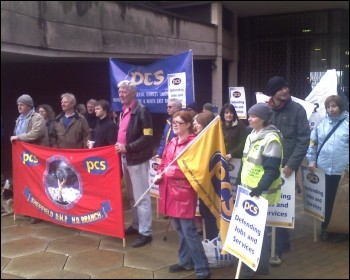Following the tremendous civil service two-day strike on 8 and 9 March, PCS members once again demonstrated their anger at the government’s attempt to rip up their contracts under the Civil Service Compensation Scheme. On budget day – 24 March – PCS members again took strike action and the message to Brown, Jowell and the Cabinet Office was clear – PCS will continue its campaign until there is a negotiated settlement.
John McInally, Public and Commercial Services union (PCS) national vice-president, personal capacity
Chancellor Alistair Darling crossed PCS picket lines to deliver his budget speech. Many areas reported increased participation in this action, and the Department for Work and Pensions group has recruited 1,200 new PCS members since the campaign began.
PCS members know this dispute is about more than defending redundancy payment terms, it is about defending jobs and services and preventing privatisation. Whoever wins the election will target the civil service for major cuts: all the main political parties agree working and middle-class people must pay for the economic mess made by the banks and the unregulated free market.
Hidden in the detail of Darling’s plans is the shocking truth Labour is seeking to hide from working class voters – cuts of up to 25% in some departments, far deeper than anything under Thatcher. Our dispute is an important early sign of workers’ struggles to resist and reverse the political establishment’s plans for a decade of “austerity” – which will mean misery for most in society.
The hypocrisy of Brown and Labour ministers calling for negotiations to settle the British Airways and rail disputes, while refusing to negotiate with their own workforce, has angered many, including Labour MPs.
165 MPs, the vast majority Labour, have now signed the Early Day Motion supporting the union’s position. These MPs understand that to attack low-paid workers in the run-up to a general election will mean that civil servants who are unlikely to vote Tory are more likely not to vote at all, endangering the seats of Labour MPs in marginal constituencies.
The exposure of appalling Stephen “cab for hire” Byers, architect of New Labour and unprincipled low-life, who was prepared to use his ‘contacts’ as a former minister to line his own pockets, could not be a sharper contrast with hard working and low paid civil servants.
PCS’s national executive committee (NEC) met after the strike to plan the next stages of the campaign. April’s NEC will consider further industrial action in relation to any announcements on the general election date. The government is the employer so there may be an issue as to whether there is actually anyone to negotiate with for a period of time. The national overtime ban will be extended until 14 May and departmental groups will be asked to draw up plans for disruptive action and work-to-rules.
PCS’s political campaigning will be stepped up. This high profile activity will include targeting ministerial and marginal constituencies, including a national tour of our “battle bus” to such constituencies and larger workplaces. If ministers think we are going to ground until the election is over then they are in for a rude awakening. We will expose their treatment of low-paid workers and their plans to make us pay for the crisis caused by their friends in the City.
PCS is also continuing with its legal challenge to the redundancy scheme cuts. The government is running scared and they have used the most cynical delaying tactics to have it put back until April, but PCS will have its day in court, as well as its days on the picket lines. PCS will use all available methods to build the pressure until there is a fair and acceptable negotiated settlement.










